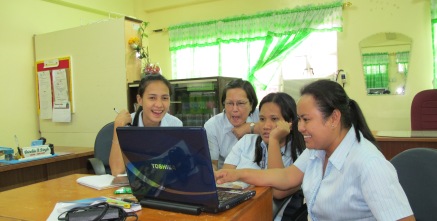Popularizing Lesson Study
The reason that I was away for two days was that I observed the lesson implementation in Nueva Ecija High School (NEHS). It was part of lesson study, one of the components of the 2-year project of our institute and NEHS.
Lesson study is a professional development program for teachers that originated in Japan. In lesson study teachers collaborate with one another in developing and implementing a lesson. If you have not heard about this type of professional development program, it is now gaining popularity worldwide and is already practiced by elementary school and high school teachers in many countries.
The process in lesson comprises of the following steps:
- Defining a teaching problem based upon student needs
- Lesson Study planning, with the student and the teacher as the focus
- Focusing the lesson on student thinking, learning, and misconception
- Evaluating the lesson’s impact on student learning and reflecting on its effect
- Revising the lesson based upon the data collected
- Teaching the revised lesson to a new class of students
- Evaluating and reflecting
- Sharing the results.
The lesson developed in lesson study is called ‘research lesson.’ » Read more
